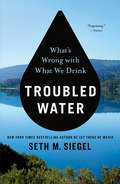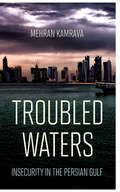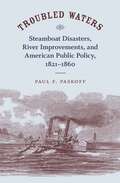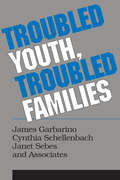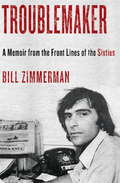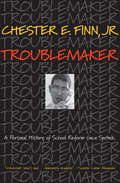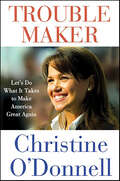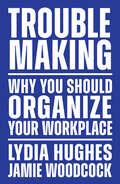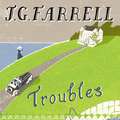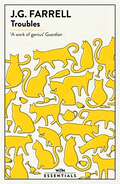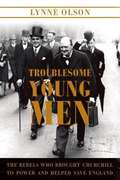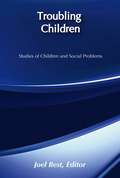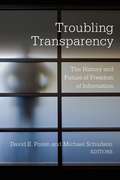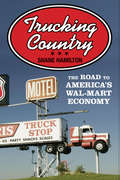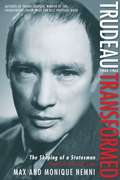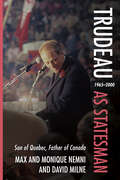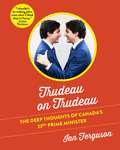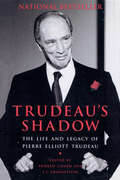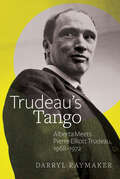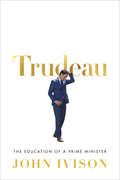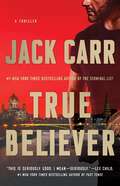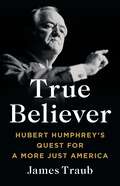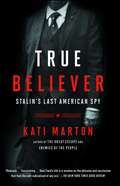- Table View
- List View
Troubled Water: What's Wrong with What We Drink
by Seth M. SiegelNew York Times bestselling author Seth M. Siegel shows how our drinking water got contaminated, what it may be doing to us, and what we must do to make it safe. If you thought America’s drinking water problems started and ended in Flint, Michigan, think again. From big cities and suburbs to the rural heartland, chemicals linked to cancer, heart disease, obesity, birth defects, and lowered IQ routinely spill from our taps. Many are to blame: the EPA, Congress, a bipartisan coalition of powerful governors and mayors, chemical companies, and drinking water utilities—even NASA and the Pentagon. Meanwhile, the bottled water industry has been fanning our fears about tap water, but bottled water is often no safer.The tragedy is that existing technologies could launch a new age of clean, healthy, and safe tap water for only a few dollars a week per person. Scrupulously researched, Troubled Water is full of shocking stories about contaminated water found throughout the country and about the everyday heroes who have successfully forced changes in the quality and safety of our drinking water. And it concludes with what America must do to reverse decades of neglect and play-it-safe inaction by government at all levels in order to keep our most precious resource safe.
Troubled Waters: Insecurity in the Persian Gulf (Persian Gulf Studies)
by Mehran KamravaTroubled Waters looks at four dynamics in the Persian Gulf that have contributed to making the region one of the most volatile and tension-filled spots in the world. Mehran Kamrava identifies the four dynamics as: the neglect of human dimensions of security, the inherent instability involved in reliance on the United States and the exclusion of Iraq and Iran, the international and security policies pursued by inside and outside actors, and a suite of overlapping security dilemmas. These four factors combine and interact to generate long-term volatility and ongoing tensions within the Persian Gulf.Through insights from Kamrava’s interviews with Gulf elites into policy decisions, the consequences of security dilemmas, the priorities of local players, and the neglect of identity and religion, Troubled Waters examines the root causes of conflicts and crises that are currently unfolding in the region. As Kamrava demonstrates, each state in the region, including Saudi Arabia, Iran, and Qatar, has embarked on vigorous security-producing efforts as part of foreign policy, flooding the area with more munitions—thereby increasing insecurity and causing more mistrust in a part of the world that needs no more tension.
Troubled Waters: Steamboat Disasters, River Improvements, and American Public Policy, 1821--1860
by Paul F. PaskoffIn Troubled Waters, Paul F. Paskoff offers a comprehensive examination of the federal government's river improvements program, which aimed to reduce hazards to navigation on the great rivers of America's interior during the early and mid-nineteenth century. Danger on the rivers came in a variety of forms. Shoals, rapids, ice, rocks, sandbars, and uprooted trees and submerged steamboat wrecks lodged in river beds were the most common perils and accounted for the largest number of steamboat disasters. This daunting array of river hazards required a similarly broad range of efforts to remove or at least ameliorate them. Against a variety of obstacles -- natural, political, and technological -- the river improvements program succeeded in reducing the rate of steamboat loss, even as steamboat traffic dramatically increased. Its success, Paskoff argues, demonstrates that the federal government was far more active than generally thought in promoting economic growth and development in the years leading up to the Civil War.The river improvements program was one of the most volatile issues in national, sectional, and state politics, touching on questions of economic development, constitutional law, partisan politics, and sectional rivalry. Paskoff examines the controversial program from its beginnings during the early republic to 1844, giving careful attention to the policies of Andrew Jackson's administration. He explores the array of objections to the program -- some grounded in a strict interpretation of the Constitution and others in a concern over alleged federal wantonness, corruption, and waste -- and follows the political story through the administration of James K. Polk forward to secession. Paskoff also explains the fiscal, economic, and technological aspects of the hazard problem and its solution, analyzing the federal government's fiscal condition, its capacity to undertake such an ambitious program, and the influence of conditions in the larger economy, including effects of the Mexican War, upon the federal government's finances.Paskoff's lively analysis rests on a bedrock of impressive quantitative evidence, including databases containing every documented steamboat wreck -- more than 1,200 -- on American rivers, lakes, and coastal waters; construction and engine data for more than 600 steamboat packets; and all relevant federal appropriations and expenditures measures, more than 2,300 spending projects in all. Vigorously researched and vividly told, Troubled Waters is an essential contribution to the history of internal improvements in the antebellum United States.
Troubled Youth, Troubled Families: Understanding Families at Risk for Adolescent Maltreatment
by Cynthia SchellenbachThe 1970s witnessed a growing concern and awareness regarding child abuse, an awareness which gradually extended to include the maltreatment of adolescents. In the 1980s a number of intervention projects dealing with this particular problem were started. Troubled Youth, Troubled Families is one of the first full-length reports to deal with adolescent abuse.
Troublemaker: A Memoir from the Front Lines of the Sixties
by Bill ZimmermanThe political memoir as rousing adventure story--a sizzling account of a life lived in the thick of every important struggle of the era. April 1973: snow falls thick and fast on the Badlands of South Dakota. It has been more than five weeks since protesting Sioux Indians seized their historic village of Wounded Knee, and the FBI shows no signs of abandoning its siege. When Bill Zimmerman is asked to coordinate an airlift of desperately needed food and medical supplies, he cannot refuse; flying through gunfire and a mechanical malfunction, he carries out a daring dawn raid and successfully parachutes 1,500 pounds of food into the village. The drop breaks the FBI siege, and assures an Indian victory. This was not the first--or last--time Bill Zimmerman put his life at risk for the greater social good. In this extraordinary memoir, Zimmerman takes us into the hearts and minds of those making the social revolution of the sixties. He writes about registering black voters in deepest, most racist Mississippi; marching with Martin Luther King Jr. in Chicago; helping to organize the 1967 march on the Pentagon; fighting the police at the 1968 Democratic convention; mobilizing scientists against the Vietnam War and the military's misuse of their discoveries; smuggling medicines to the front lines in North Vietnam; spending time in Hanoi under U.S. bombardment; and founding an international charity, Medical Aid for Indochina, to deliver humanitarian assistance. Zimmerman--who crossed paths with political organizers and activists like Abbie Hoffman, Daniel Ellsberg, César Chávez, Jane Fonda, and Tom Hayden--captures a groundbreaking zeitgeist that irrevocably changed the world as we knew it.
Troublemaker: A Personal History of School Reform since Sputnik
by Chester E. FinnFew people have been more involved in shaping postwar U.S. education reforms--or dissented from some of them more effectively--than Chester Finn. Assistant secretary of education under Ronald Reagan, and an aide to politicians as different as Richard Nixon and Daniel Moynihan, Finn has also been a high school teacher, an education professor, a prolific and best-selling writer, a think-tank analyst, a nonprofit foundation president, and both a Democrat and Republican. This remarkably varied career has given him an extraordinary insider's view of every significant school-reform movement of the past four decades, from racial integration to No Child Left Behind. In Troublemaker, Finn has written a vivid history of postwar education reform that is also the personal story of one of the foremost players--and mavericks--in American education. Finn tells how his experiences have shaped his changing views of the three major strands of postwar school reform: standards-driven, choice-driven, and profession-driven. Of the three, Finn now believes that a combination of choice and standards has the greatest potential, but he favors this approach more on pragmatic than ideological grounds, arguing that parents should be given more options at the same time that schools are allowed more flexibility and held to higher performance norms. He also explains why education reforms of all kinds are so difficult to implement, and he draws valuable lessons from their frequent failure. Clear-eyed yet optimistic, Finn ultimately gives grounds for hope that the best of today's bold initiatives--from charter schools to technology to makeovers of school-system governance--are finally beginning to make a difference.
Troublemaker: Let's Do What It Takes to Make America Great Again
by Christine O'DonnellThe 2010 candidate for Senate—and established political "troublemaker"*--voices the quiet anger in America today: where it comes from, what it's asking for, and where it's going from here*Time MagazineFrom the moment she upset a heavily-favored incumbent in the primary for the special election to fill the Senate seat vacated by Joe Biden, Christine O'Donnell made headlines. Though she didn't win the general election, O'Donnell did win the designation of 2010's Most Covered Candidate. And what people were talking about wasn't just gossip: they responded to a fresh, unencumbered voice that appealed to voter frustration with politics—and politicians—as usual.America's strength lies in its government "by the people, for the people", but too many of those people feel they are now just labeled featureless residents of "flyover country", told what to think and what they can and cannot do by an entrenched, reigning class of elites. O'Donnell's candidacy gave hope that the voices of real people—the people—not only can be heard but can also become a force. Part of this hope is invested in the nascent Tea Party, but most of it is invested in individual voters who are willing to work hard and make sacrifices for what they believe in, not what backroom dealing and a bloated federal government has mandated is good for them.Troublemaker is about where O'Donnell comes from—the Philadelphia suburbs with five kids to a room—and what she weathered in the 2010 election. But the core of the book is a clear, straightforward discussion of an America that yearns to embrace freedom and opportunity through personal responsibility, and how it is hamstrung and stymied by excessive regulation, taxation, and the sanctimony of a "nanny state." And Troublemaker will deliver an important, rousing message about what we do with the quiet anger in America today: where we can go, and how strong we can be, from here. Warning readers that challenging the status quo makes the political establishment push back, O'Donnell wants to build a movement that will continue to goad it.It's practical, too, since O'Donnell believes in power through participation: it's not enough to grumble about how things are going; pitch in and try to change things if you care. O'Donnell details how she participated by running for high office as an everywoman, but also shows how attending town council meetings, organizing a petition drive, making an effort to meet a staffer in your local representative's office, or simply reading the minutes from your community board can make a difference.
Troublemaking: Why You Should Organize Your Workplace
by Jamie Woodcock Lydia HughesThere are no unorganisable workers, only workers yet to be organised.There has been an explosion of organising among workers many assumed to be unorganisable, from delivery drivers in London to tech workers in Silicon Valley. The culmination of years of conversations on picket lines, in community centres, and in union offices, with workers in Britain, the US, India, Argentina, South Africa, Brazil, and across Europe, Troublemaking brings together lessons from around the world. Precarious workers waste collectors in Mumbai show that no worker is &“unorganisable,&” cleaner organising at LSE and St Mary&’s hospital in London and Sans-papier workers in France indicate that demanding more at work can lead to big wins. Struggles like The Water Wars in Cochabamba, Bolivia show how we can use our power beyond the workplace. From these movements, Lydia Hughes and Jamie Woodcock draw a number of lessons about why organising at work is the first step in building another world. They put forward three principles for organising. First, the need for action. Struggles can change the world, but they also change people who go through them. Rather than using action as a last resort, we need action to build a movement. Second, the need to build the rank-and-file of unions. Power comes from organising at work, not in trusting others to do it on our behalf. Third, democracy matters in organising. This is not only about winning, but also developing the confidence to build another kind of world. This is not a &“how to&” guide, but a set of principles for the politics of organising.
Troubles: Winner of the Lost Man Booker Prize 1970 (W&N Essentials)
by J. G. FarrellWinner of the 1970 lost Man Booker prize in 2010.Major Brendan Archer travels to Ireland - to the Majestic Hotel and to the fiancée he acquired on a rash afternoon's leave three years ago. Despite her many letters, the lady herself proves elusive, and the Major's engagement is short-lived. But he is unable to detach himself from the alluring discomforts of the crumbling hotel. Ensconced in the dim and shabby splendour of the Palm Court, surrounded by gently decaying old ladies and proliferating cats, the Major passes the summer. So hypnotic are the faded charms of the Majestic, the Major is almost unaware of the gathering storm. But this is Ireland in 1919 - and the struggle for independence is about to explode with brutal force.(p) Orion Publishing Group 2018
Troubles: Winner of the Lost Man Booker Prize 1970 (W&N Essentials)
by J.G. FarrellWINNER OF THE 1970 BOOKER PRIZE'And so at the Majestic everything returned to the way it had been before. The gleaming tiles became dulled. Sofas as sleek as prize cattle lost their glow.' 1919, the Majestic Hotel in Kinalough, Ireland. Haunted war veteran Major Brendan Archer arrives to marry Angela Spencer, daughter of the house. But his fiancée is strangely altered, and her family's fortunes have suffered a spectacular decline. The hotel's hundreds of rooms are disintegrating; its few remaining guests thrive on rumours and games of whist; herds of cats have taken over the Imperial Bar; bamboo shoots threaten the foundations; and piglets frolic in the squash court. And outside the order of the British Empire totters, as the violence of 'the troubles' mounts. 'A work of genius' Guardian
Troubles: Winner of the Lost Man Booker Prize 1970 (W&N Essentials)
by J.G. FarrellWINNER OF THE 1970 BOOKER PRIZE'And so at the Majestic everything returned to the way it had been before. The gleaming tiles became dulled. Sofas as sleek as prize cattle lost their glow.' 1919, the Majestic Hotel in Kinalough, Ireland. Haunted war veteran Major Brendan Archer arrives to marry Angela Spencer, daughter of the house. But his fiancée is strangely altered, and her family's fortunes have suffered a spectacular decline. The hotel's hundreds of rooms are disintegrating; its few remaining guests thrive on rumours and games of whist; herds of cats have taken over the Imperial Bar; bamboo shoots threaten the foundations; and piglets frolic in the squash court. And outside the order of the British Empire totters, as the violence of 'the troubles' mounts. 'A work of genius' Guardian
Troublesome Young Men: The Rebels Who Brought Churchill to Power and Helped Save England
by Lynne OlsonA riveting history of the daring politicians who challenged the disastrous policies of the British government on the eve of World War II. On May 7, 1940, the House of Commons began perhaps the most crucial debate in British parliamentary history. On its outcome hung the future of Prime Minister Neville Chamberlain's government and also of Britain indeed, perhaps, the world. Troublesome Young Men is Lynne Olson's fascinating account of how a small group of rebellious Tory MPs defied the Chamberlain government's defeatist policies that aimed to appease Europe's tyrants and eventually forced the prime minister's resignation. Some historians dismiss the "phony war" that preceded this turning point --from September 1939, when Britain and France declared war on Germany, to May 1940, when Winston Churchill became prime minister--as a time of waiting and inaction, but Olson makes no such mistake, and describes in dramatic detail the public unrest that spread through Britain then, as people realized how poorly prepared the nation was to confront Hitler, how their basic civil liberties were being jeopardized, and also that there were intrepid politicians willing to risk political suicide to spearhead the opposition to Chamberlain --Harold Macmillan, Robert Boothby, Leo Amery, Ronald Cartland, and Lord Robert Cranborne among them. The political and personal dramas that played out in Parliament and in the nation as Britain faced the threat of fascism virtually on its own are extraordinary --and, in Olson's hands, downright inspiring.
Troubling Children: Studies of Children and Social Problems (Social Problems And Social Issues Ser.)
by Joel BestIncreasingly, sociologists have turned their attention to the social problems of children– in particular, of younger children. This collection reflects those recent interest. While most researchers have focused on social problems involving adolescents, this volume offers instead original case studies of problems concerning preadolescent children.The papers that Best has gathered here represent different theoretical and methodological approaches. They report on social issues in Albania, Kenya, and Japan as well as in the United States. The range of social problems they address is a wide one, from broad societal crises to decision-making within families. Topics include the effects of economic and social crises in Africa and Eastern Europe; concerns about crack use and other forms of fetal endangerment; parental decisions about spanking, toy choices, and letting children listen to rock music; schooling in day care and elementary and junior high schools; and children's perceptions of environmental crises.Troubling Children adds a new dimension to courses in social problems. It also offers a different set of perspectives for those concerned with sociology of preadolescent children and their discontents.
Troubling Transparency: The History and Future of Freedom of Information
by Michael Schudson David E. PozenToday, transparency is a widely heralded value, and the U.S. Freedom of Information Act (FOIA) is often held up as one of the transparency movement’s canonical achievements. Yet while many view the law as a powerful tool for journalists, activists, and ordinary citizens to pursue the public good, FOIA is beset by massive backlogs, and corporations and the powerful have become adept at using it for their own interests. Close observers of laws like FOIA have begun to question whether these laws interfere with good governance, display a deleterious anti-public-sector bias, or are otherwise inadequate for the twenty-first century’s challenges.Troubling Transparency brings together leading scholars from different disciplines to analyze freedom of information policies in the United States and abroad—how they are working, how they are failing, and how they might be improved. Contributors investigate the creation of FOIA; its day-to-day uses and limitations for the news media and for corporate and citizen requesters; its impact on government agencies; its global influence; recent alternatives to the FOIA model raised by the emergence of “open data” and other approaches to transparency; and the theoretical underpinnings of FOIA and the right to know. In addition to examining the mixed legacy and effectiveness of FOIA, contributors debate how best to move forward to improve access to information and government functioning. Neither romanticizing FOIA nor downplaying its real and symbolic achievements, Troubling Transparency is a timely and comprehensive consideration of laws such as FOIA and the larger project of open government, with wide-ranging lessons for journalism, law, government, and civil society.
Trucking Country
by Shane HamiltonTrucking Country is a social history of long-haul trucking that explores the contentious politics of free-market capitalism in post-World War II America. Shane Hamilton paints an eye-opening portrait of the rural highways of the American heartland, and in doing so explains why working-class populist voters are drawn to conservative politicians who seemingly don't represent their financial interests. Hamilton challenges the popular notion of "red state" conservatism as a devil's bargain between culturally conservative rural workers and economically conservative demagogues in the Republican Party. The roots of rural conservatism, Hamilton demonstrates, took hold long before the culture wars and free-market fanaticism of the 1990s. As Hamilton shows, truckers helped build an economic order that brought low-priced consumer goods to a greater number of Americans. They piloted the big rigs that linked America's factory farms and agribusiness food processors to suburban supermarkets across the country.Trucking Country is the gripping account of truckers whose support of post-New Deal free enterprise was so virulent that it sparked violent highway blockades in the 1970s. It's the story of "bandit" drivers who inspired country songwriters and Hollywood filmmakers to celebrate the "last American cowboy," and of ordinary blue-collar workers who helped make possible the deregulatory policies of Jimmy Carter and Ronald Reagan and set the stage for Wal-Mart to become America's most powerful corporation in today's low-price, low-wage economy.
Trudeau Transformed: The Shaping of a Statesman 1944-1965
by Monique Nemni Max NemniThis groundbreaking biography continues the story begun in Young Trudeau, taking Canada's legendary Prime Minister from his pro-fascist youth all the way to his entry into federal politics as a crusading Liberal democrat.When he went to Harvard in 1944, Pierre Trudeau was twenty-five, a recent graduate of the University of Montreal Law School; true to his elite Catholic-French education, he had been till recently pro-fascist, and he disliked democracy. Years of graduate study at Harvard, then the Sorbonne, then the London School of Economics exposed him to new ideas, as did his hitchhiking travels around the world. Returned to Quebec as a new man, he engaged in educating workers and other jobs that made him a famous defender of federal democracy. He entered Parliament in 1965, within three years of rocketing, Obama-like, to the very top.From the Hardcover edition.
Trudeau as Statesman: 1965–2000, Son of Quebec, Father of Canada
by Monique Nemni Max Nemni David MilnePierre Elliott Trudeau takes on the Quebec Question with a bang, not a whimper. In Max and Monique Nemni’s third and final volume of their Pierre Elliott Trudeau biography, the man who would be statesman is granted his life’s wish. In his fifteen years as prime minister of Canada, Trudeau oversaw the controversial White Paper of 1969 on Indigenous policy, the fateful October Crisis of 1970, and the repatriation of the Canadian Constitution together with a Charter of Rights and Freedoms. In retirement, he exercised immense influence over Canada’s later constitutional politics and was principally responsible for defeating both the Meech Lake and Charlottetown Accords during the government of Brian Mulroney. Loved and hated in almost equal measure, Trudeau was an iconoclast, shaking up Canada’s two solitudes as no other prime minister has ever dared to do. In this meticulously researched and argued political biography, Pierre Trudeau is seen wrestling with the most difficult — and momentous — decisions of his career.
Trudeau on Trudeau: The Deep Thoughts of Canada's 23rd Prime Minister
by Ian FergusonA satirical journey through the mind of the part-time snowboarding instructor and drama teacher who is the prime minister of Canada.Trudeau on Trudeau is a book like no other. It’s a collection of real words spoken by Prime Minister Justin Trudeau that paints a portrait of a man who hasn’t quite gotten the hang of leading Canada. Included are familiar quotes, such as “The budget will balance itself”; the infamous “You are a piece of sh*t”; and the plain pathetic “We will grow the economy from the heart out”; and many, many more. Full of real photos of Justin taking selfies, quizzes, a photo album of Justin’s taxpayer-funded vacation in India, and laugh-out-loud commentary, Trudeau on Trudeau is sure to answer the question, “What happens when a part-time snowboarder and drama teacher becomes prime minister of Canada?” Trudeau on Trudeau is a must-have, not just for political junkies, but for any and all Canadians who care about the future of our country.
Trudeau's Shadow: The Life and Legacy of Pierre Elliott Trudeau
by J. L. GranatsteinThe Life and Legacy of Pierre Eilliott Trudeau
Trudeau's Tango: Alberta Meets Pierre Elliott Trudeau, 1968–1972
by Darryl RaymakerA chronicle of Pierre Elliot Trudeau’s first term as prime minister and the attempt to bridge one of Canada’s classic political fault lines.Trudeau appeared to enjoy the encounter. He stood his ground while escaping projectiles, including a tomato . . .In this insightful and lively history, Liberal insider Darryl Raymaker recalls the attempt to broker “a marriage from hell” between the federal Liberal Party and Alberta’s Social Credit government in the late 1960s. Raymaker uses his deep connections and backroom knowledge to trace the tangled political relationships that developed when charismatic statesman Pierre Trudeau confronted the forces of oil and agriculture in Canada’s west. Part memoir, part chronicle, Trudeau’s Tango provides a window into Canadian history, politics, economics and the zeitgeist of the late 1960s.“Trudeau’s Tango is part memoir, part documentary of the geographic, cultural and political divisions that are a permanent fixture of Confederation. The fact we held it together remains a world-class achievement. . . . Compelling reading for any Canada 150 book club . . . A fresh and lively account of politics with sharp elbows.” —Holly Doan, Blacklock’s Reporter“An excellent book about Alberta and the Trudeaus.” —Warren Kinsella, HuffPost“[Raymaker’s] book recalls a tumultuous political era with wry humour and a touch of anger.” —Frank Dabbs, Alberta Views“A detailed chronology of the history and tangled political relationships of the Liberal Party at the national and provincial levels and its opponents in Alberta—the once dominant Social Credit Party and then the Progressive Conservatives—from December 1967 through November 1972. The account is filled with blow-by-blow descriptions of political events and encounters at the provincial level. . . . Recommended.” —G.A. McBeath, CHOICEMagazine
Trudeau: The Education of a Prime Minister
by John IvisonFrom one of Canada's most popular and connected political journalists, an unblinkered warts-and-all look at Justin Trudeau and the Liberal government's record in power. A must-read as we head into the 2019 federal election.Canadians are becoming increasingly skeptical about their chameleon prime minister. When he entered politics, Justin Trudeau came across as a person with no fixed principles. Now, he presents himself as a conviction politician. What motivated his metamorphosis—belief or opportunism? Either way, in 2019’s election he will be judged on results—results that have so far been disappointing for many, even those in his own party. From the ballooning deficit to the Trans Mountain purchase to the fallout of his disastrous trip to India to the unpopular implementation of a carbon tax, Justin Trudeau has presided over his share of controversy. Most damaging, his egregious missteps during the SNC-Lavalin scandal and the subsequent resignation of two top ministers, his principal secretary, and the clerk of the Privy Council have raised serious questions about Trudeau’s integrity. As a political columnist for the National Post since 2003and Ottawa bureau chief for Postmedia for the past three years, John Ivison has watched Trudeau evolve as a politician and leader, a fascinating transition that has not been fully captured by any writer. Trudeau traces the complexities of the man himself, now barely visible beneath the talking points, virtue signalling, and polished trappings of office. Ivison concludes that while Trudeau led a moribund Liberal Party to victory in the 2015 election, the shine of his leadership has been worn off by a series of self-inflicted wounds, broken promises, and rookie mistakes. One of the central contentions of Trudeau is already apparent: the prime minister’s greatest strengths are also his greatest weaknesses; the famous name, high-handedness, and impulsiveness are as liable to hurl him from office as they were to get him there in the first place. With unprecedented access and insight, John Ivison takes us inside one of the most contentious first terms of any prime minister in our history.
True American: Language, Identity, and the Education of Immigrant Children
by Rosemary C. SalomoneHow can schools meet the needs of an increasingly diverse population of newcomers? Do bilingual programs help children transition into American life, or do they keep them in a linguistic ghetto? Are immigrants who maintain their native language uninterested in being American, or are they committed to changing what it means to be American? In this ambitious book, Rosemary Salomone uses the heated debate over how best to educate immigrant children as a way to explore what national identity means in an age of globalization, transnationalism, and dual citizenship. She demolishes popular myths—that bilingualism impedes academic success, that English is under threat in contemporary America, that immigrants are reluctant to learn English, or that the ancestors of today’s assimilated Americans had all to gain and nothing to lose in abandoning their family language. She lucidly reveals the little-known legislative history of bilingual education, its dizzying range of meanings in different schools, districts, and states, and the difficulty in proving or disproving whether it works—or defining it as a legal right. In eye-opening comparisons, Salomone suggests that the simultaneous spread of English and the push toward multilingualism in western Europe offer economic and political advantages from which the U.S. could learn. She argues eloquently that multilingualism can and should be part of a meaningful education and responsible national citizenship in a globalized world.
True Believer: A Thriller (Terminal List #2)
by Jack CarrINSTANT BESTSELLER &“Take my word for it, James Reece is one rowdy motherf***er. Get ready!&” —Chris Pratt, star of the #1 Amazon Prime series The Terminal List &“Jack Carr and his alter-ego protagonist, James Reece, continue to blow me away.&” —Mark Greaney, #1 New York Times bestselling author of Mission Critical In #1 New York Times bestselling author Jack Carr&’s follow-up to The Terminal List, former Navy SEAL James Reece&’s skill, cunning, and heroism put the US government back in his debt and set him on another path of revenge. When a string of horrific terrorist attacks plagues the Western world during the holiday season, the broader markets fall into a tailspin. The attacks are being coordinated by a shadowy former Iraqi commando who has disappeared into Europe&’s underground. The United States government has an asset who can turn the Iraqi against his masters: James Reece, the most-wanted domestic terrorist alive. After avenging the deaths of his family and team members, Reece emerges deep in the wilds of Mozambique, protected by the family of his estranged best friend and former SEAL Team member. When a series of events uncovers his whereabouts, the CIA recruits him, using a Presidential pardon for Reece and immunity for the friends who helped him in his mission of vengeance. Now a reluctant tool of the United States government, Reece travels the globe, targeting terrorist leaders, unraveling a geopolitical conspiracy that exposes a traitorous CIA officer, and uncovering a sinister assassination plot with worldwide repercussions. A high-intensity roller-coaster race against time, True Believer is &“one of this year&’s hottest thrillers, and a perfect fit for fans of Vince Flynn, Brad Thor, and Daniel Silva&” (The Real Book Spy).
True Believer: Hubert Humphrey's Quest for a More Just America
by James TraubA celebrated historian recounts Hubert Humphrey&’s role as a liberal hero of twentieth-century America Hubert Humphrey was liberalism&’s most dedicated defender, and its most public and tragic sacrifice. As a young politician in 1948, he defied segregationists and forced the Democratic Party to commit itself to civil rights. As a senator in 1964, he made good on that commitment by helping pass the Civil Rights Act. But as Lyndon B. Johnson&’s vice president, his support for the war in Vietnam made him a target for both Right and Left, and he suffered a shattering loss in the presidential election of 1968. Though Humphrey&’s defeat was widely seen as the end of America&’s era of liberal optimism, he never gave up. Even after his humiliation on the most public stage, he crafted a new vision of economic justice to counter the yawning political divisions consuming American politics. This biography reveals a deep-dyed idealist willing to compromise and even fight ugly in pursuit of a better society. Elegantly crafted and strikingly relevant to the present, True Believer celebrates Hubert Humphrey&’s long struggle for justice for all.
True Believer: Stalin's Last American Spy
by Kati MartonThis astonishing real-life spy thriller, filled with danger, misplaced loyalties, betrayal, treachery, and pure evil, with a plot twist worthy of John le Carré, is relevant today as a tale of fanaticism and the lengths it takes us to.True Believer reveals the life of Noel Field, an American who betrayed his country and crushed his family. Field, once a well-meaning and privileged American, spied for Stalin during the 1930s and '40s. Then, a pawn in Stalin's sinister master strategy, Field was kidnapped and tortured by the KGB and forced to testify against his own Communist comrades. How does an Ivy League-educated, US State Department employee, deeply rooted in American culture and history, become a hardcore Stalinist? The 1930s, when Noel Field joined the secret underground of the International Communist Movement, were a time of national collapse: ten million Americans unemployed, rampant racism, retreat from the world just as fascism was gaining ground, and Washington--pre FDR--parched of fresh ideas. Communism promised the righting of social and political wrongs and many in Field's generation were seduced by its siren song. Few, however, went as far as Noel Field in betraying their own country. With a reporter's eye for detail, and a historian's grasp of the cataclysmic events of the twentieth century, Kati Marton captures Field's riveting quest for a life of meaning that went horribly wrong. True Believer is supported by unprecedented access to Field family correspondence, Soviet Secret Police records, and reporting on key players from Alger Hiss, CIA Director Allen Dulles, and World War II spy master, "Wild Bill" Donovan--to the most sinister of all: Josef Stalin. A story of another time, this is a tale relevant for all times.
